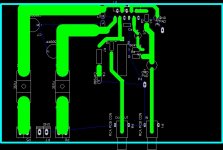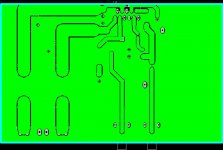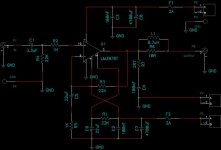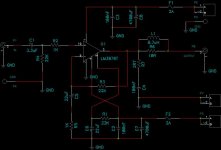I'm trying to start an amplifier up (LM3876) but at +-13VDC my speaker starts popping.
I noticed that my input capacitor's polarity is the other way around than National's Datasheets, would this be the problem or does the polarity of THIS cap not matter?
I noticed that my input capacitor's polarity is the other way around than National's Datasheets, would this be the problem or does the polarity of THIS cap not matter?
Minimum voltage is _very_ near that you have. Have you checked the datasheets about that? You have a feature which is called "under voltage protection". How about the mute resistor?
The problem is probably that I'm scared to give it horns. This is a hobby for me and getting cash a tad limited. I don't want to blow the IC since it costs a bit here.
The popping's speed increases with the voltage to up to 17VDC ( there I lose the heart to go higher for now.) It sounds like a Harley 🙂
PS I'm running a variac into a 35-0-35 DC supply (No regulation but HUGE caps).
The components aren't getting warm yet, do you think I should go a bit higher?
The popping's speed increases with the voltage to up to 17VDC ( there I lose the heart to go higher for now.) It sounds like a Harley 🙂
PS I'm running a variac into a 35-0-35 DC supply (No regulation but HUGE caps).
The components aren't getting warm yet, do you think I should go a bit higher?
How ldoes your decoupling of the supply voltage look like? Have you any caps near the IC? How does your ground look like?
Have you checked the datasheet and the AN-1192 application note carefully?
Have you checked the datasheet and the AN-1192 application note carefully?
even i had such a problem before.
but my problem was solved when i placed the cd player on a pillow.
the speaker vibrations were making the cd player pop. looolll
i think ur problem might be due to caps. have u places caps at the chips psu pins? and also a cap at the mute pin and ground.
and i would suggest using 2 4700uf caps instead of one 10000uf cap. in psu.
i think ur problem might be solved.
and if ur not so confident i would suggest to put a fuse near the speakers so that they dont blow up.
usually this doesnt happen in chip amps as they have lots of protection circuitry
but my problem was solved when i placed the cd player on a pillow.
the speaker vibrations were making the cd player pop. looolll
i think ur problem might be due to caps. have u places caps at the chips psu pins? and also a cap at the mute pin and ground.
and i would suggest using 2 4700uf caps instead of one 10000uf cap. in psu.
i think ur problem might be solved.
and if ur not so confident i would suggest to put a fuse near the speakers so that they dont blow up.
usually this doesnt happen in chip amps as they have lots of protection circuitry
Wynand said:I'm trying to start an amplifier up (LM3876) but at +-13VDC my speaker starts popping.
I noticed that my input capacitor's polarity is the other way around than National's Datasheets, would this be the problem or does the polarity of THIS cap not matter?
AC-couple the input is no good(you never know what signal may come out of a source). I might or might not AC-couple the feedback.I like a feedback cap to set DC gain to unity.
so,I think you can remove C1,move R4 after R2,use BP cap for C5.
Z
The Problem was found!!!!
merely a novice's mistake.
I forgot to connect pin 7 to ground when I etched/drew it.
Thus there was no reference to GND which let it float which caused what I suspect a DC voltage to apear at the output.
Luckily my speaker still works, although its a rubbish one anyway.
merely a novice's mistake.
I forgot to connect pin 7 to ground when I etched/drew it.
Thus there was no reference to GND which let it float which caused what I suspect a DC voltage to apear at the output.
Luckily my speaker still works, although its a rubbish one anyway.
- Status
- Not open for further replies.
- Home
- Amplifiers
- Chip Amps
- Input Capacitor Polarity



